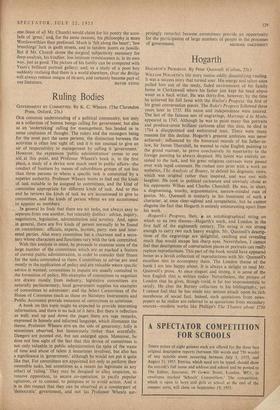Ruling Bodies
GOVERNMENT BY COMMITTEE. By K. C. Wheare. (The Clarendon Press, Oxford, 25s.) OUR common understanding of a political community, not only as a collection of human beings calling for government, but also as an 'undertaking' calling for management, has landed us in some confusion of thought. The rulers and the managers being for the most part the same persons, the distinction between the activities is often lost sight of; and it is not unusual to give an air of respectability to management by calling it 'government.' However, the expression 'public administration' comes to our aid,at this point, and Professor Wheare's book is, in the first place, a study of a device now much used in public' affairs—the conduct of business by means of subordinate groups of not less than three persons to whom a specific task is committed by a superior authority. Professor Wheare wants to find out the kinds of task suitable to be assigned to committees, and the kind of committee appropriate for different kinds of task. And to this end he reviews the kinds of task we are accustomed to give to committees, and the kinds of person whom we are accustomed to appoint as methbers.
In general he finds that there' are six tasks, not always easy to separate from one another, but tolerably distinct: advice, inquiry, negotiation, legislation, administration and scrutiny. And, again in general, there are five kinds of person normally to be found on committees: officials, experts, laymen, party men and inter- ested parties. Also every committee has a chairman and a secre- tary whose characters and functions vary with the task committed.
With this analysis in mind, he proceeds to examine some of the large number of the committees which are so marked a feature of current public administration, in order to consider their fitness for the tasks committed to them. Committees to advise are used mostly in the application of policy and are valuable where specific advice is wanted; committees to inquire are usually consulted in the formation of policy. His examples of committees to negotiate are drawn mostly from industry; legislative committees are naturally parliamentary; local government supplies his examples of committees to administer; and the Select Committees of the HoUse of Commons (such as those on Statutory Instruments and Public Accounts) provide instances of committees to scrutinise.
A book on this topic might be expected to provide interesting information, and there is no lack of it here. But there is reflection as well; and up and down the pages there are sage remarks, expressed in homely and informal language, which illuminate the theme. Professor 'Nheare errs on the side of generosity; folly is sometimes observed, but humorously rather than scornfully. Dangers are pointed out, but not enlarged upon. Moreover, he does not lose sight of the fact that this device of committees is not only valuable in public administration (in spite of the waste of time and abuse of talent it Sometimes involves), but also has a significance in 'government,' although he would not put it quite like that. For committees are appointed not only to perform their ostensible tasks, but sometimes as a means (ai legitimate as any other) of 'ruling.' They may be designed to allay suspicion, to remove opposition, to secure co-operation, to pacify popular agitation, or to conceal, to postpone or to avoid action. And it is in this respect that they can be observed as a counterpart of 'democratic' government, and not (as Professor Wheare sur-
prisingly remarks) because committees provide an opportunity for the participation of large numbers of people in the processes


















































 Previous page
Previous page